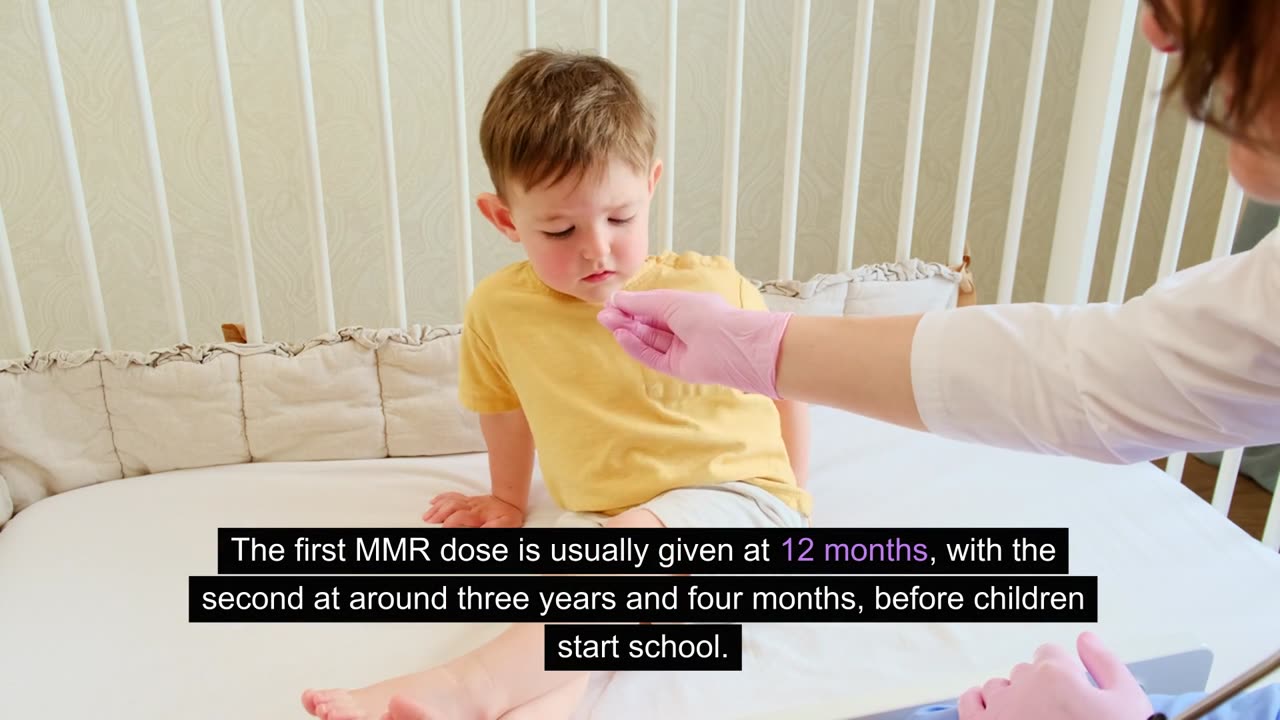Premium Only Content

"Measles Outbreaks: Rising Cases and Severe Symptoms - Protecting Your Health"
In this video, we discuss the alarming rise in measles cases and the severe symptoms associated with this highly contagious disease. The UK Health Security Agency has issued a warning about the rapid spread of measles, emphasizing the importance of vaccination. Pop-up clinics have been established to ensure children receive the necessary immunizations.
Measles is primarily transmitted through coughs and sneezes, making it highly contagious. While it typically resolves within 7-10 days, complications can arise if the infection spreads to other parts of the body such as the lungs or brain. These complications include pneumonia, meningitis, blindness, and seizures. Those at a higher risk include babies, young children, pregnant women, and individuals with weakened immune systems. Though rare, measles can be fatal, with 23 reported deaths between 2000 and 2022.
The main reason for the upsurge in measles cases is the inadequate number of young primary school children receiving the MMR vaccine. The MMR vaccine is highly effective against measles, mumps, and rubella. However, only 85% of children in 2022-23 received two doses of the vaccine by the age of five, falling short of the World Health Organization's target of 95%. This lack of vaccination contributes to the occurrence of measles outbreaks, with the West Midlands and Birmingham experiencing the highest number of cases. London has also seen smaller outbreaks, particularly in areas where vaccination rates are lower, such as Hackney.
As of 2023, there have been 1,603 suspected cases of measles in England and Wales, a significant increase compared to 2022 (735 cases) and 2021 (360 cases), according to the UK Health Security Agency.
In this video, we also explore the symptoms of measles and the characteristic rash that appears a few days after initial symptoms. Symptoms may include high fever, sore and watery eyes, coughing, sneezing, and a general feeling of illness. Small white spots can emerge inside the mouth, while a blotchy red or brown rash typically appears on the face and behind the ears before spreading to the rest of the body. It is worth noting that the rash may be harder to detect on brown and black skin.
Understanding how measles spreads is crucial in preventing its transmission. The virus is contained in tiny droplets released through coughing or sneezing. Measles is contracted by breathing in these droplets or touching them and subsequently bringing one's hand near the nose or mouth. Individuals with measles remain infectious for at least four days after the appearance of the rash.
To get vaccinated, it is advisable to contact your GP surgery to schedule immunizations for your child or to inquire about missed vaccinations for yourself. Pop-up clinics have also been set up, particularly in schools. The MMR vaccine is typically administered at 12 months and again at around three years and four months, prior to starting school. This vaccine significantly reduces the risk of contracting measles and subsequently infecting others. It is never too late to catch up on missed vaccinations, regardless of age. Muslim communities can request an alternative version of the vaccine called Priorix if they avoid pork products. In cases where the MMR vaccine is unsuitable, immediate protection can be offered through a treatment called human normal immunoglobulin (HNIG).
Most side effects of the MMR vaccine are mild and temporary, such as redness, soreness, and swelling at the injection site. Babies and young children may experience a fever for up to 72 hours. It is crucial to note that there is no link between the MMR vaccine and autism. Andrew Wakefield's discredited claims of a connection between the two in 1998 were subsequently dismissed, and he was struck off by the General Medical Council in 2010. Nevertheless, some parents chose not to vaccinate their children based on these claims. Now, as these children become young adults, they are being strongly urged to receive the MMR vaccine.
In the event of contracting measles, the NHS advises patients to take paracetamol or ibuprofen to alleviate fever, aches, and pains. Resting and consuming plenty of fluids are also recommended. Regular handwashing with soap, cleaning the eyes with damp cotton wool, and disposing of used tissues and cotton wool in the bin are essential hygiene practices. However, seeking immediate medical advice is necessary if shortness of breath, high persistent fever, coughing up blood, confusion, drowsiness, or seizures occur. Pregnant women and individuals with compromised immune systems should also seek urgent medical attention after potential exposure to measles.
Protect yourself and your loved ones by staying informed about measles outbreaks and taking necessary precautions. Stay tuned to learn more about the latest updates and guidance on safeguarding your health. Remember, vaccination is key to preventing the spread of measles and safeguarding public health. Stay safe and be well!
#measlesoutbreaks #risingcases #severesymptoms #healthprotection #vaccination #publichealth #preventivemeasures #virusoutbreak #diseasecontrol #immunization #healthcrisis #measlesawareness #vaccinesafety #healtheducation #diseasemanagement #communityhealth #infectiousdisease #herdimmunity #childhoodvaccines #vaccineprevention
-
 29:54
29:54
Michael Franzese
7 hours agoCan Trump accomplish everything he promised? Piers Morgan Article Breakdown
67.7K43 -
 2:08:19
2:08:19
Tactical Advisor
11 hours agoThe Vault Room Podcast 006 | Farwell 2024 New Plans for 2025
152K11 -
 34:12
34:12
inspirePlay
1 day ago $4.64 earned🏆 The Grid Championship 2024 – Cass Meyer vs. Kelly Rudney | Epic Battle for Long Drive Glory!
60.2K8 -
 17:50
17:50
BlackDiamondGunsandGear
9 hours ago $1.18 earnedTeach Me How to Build an AR-15
36.4K4 -
 9:11
9:11
Space Ice
1 day agoFatman - Greatest Santa Claus Fighting Hitmen Movie Of Mel Gibson's Career - Best Movie Ever
99.6K42 -
 42:38
42:38
Brewzle
1 day agoI Spent Too Much Money Bourbon Hunting In Kentucky
65.3K12 -
 1:15:30
1:15:30
World Nomac
17 hours agoMY FIRST DAY BACK in Manila Philippines 🇵🇭
49.5K9 -
 13:19
13:19
Dr David Jockers
1 day ago $10.13 earned5 Dangerous Food Ingredients That Drive Inflammation
70K17 -
 1:05:13
1:05:13
FamilyFriendlyGaming
1 day ago $15.59 earnedCat Quest III Episode 8
125K3 -
 10:39
10:39
Cooking with Gruel
2 days agoMastering a Succulent London Broil
80.9K5